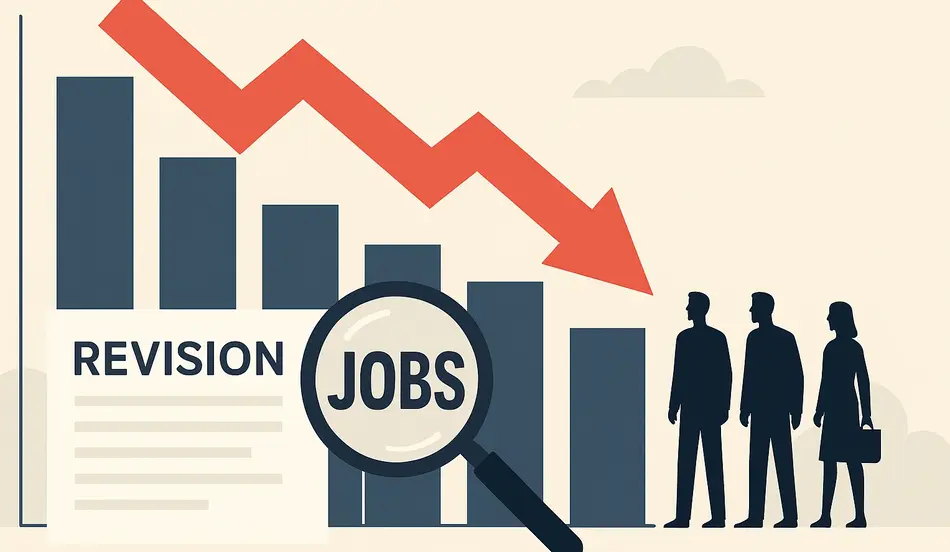Introduction: The Shocking Job Revision and Its Implications
The recent job revision by the Bureau of Labor Statistics (BLS) has sent shockwaves through the economic and political landscape. Nearly 911,000 jobs were quietly erased from the official payroll data, raising urgent questions about the true state of the Biden economy. In this comprehensive analysis, we’ll explore the causes behind this massive job revision, its implications for American workers, and what it signals about the broader economic outlook. The focus keyphrase, job revision, will guide our discussion as we examine the data, the methodology, and the real-world impact on businesses and job seekers alike.
Understanding the 911,000 Job Revision
In August 2025, the BLS announced a downward revision of 911,000 jobs from its payroll data, a move that stunned economists and policymakers. This job revision is one of the largest in recent history, casting doubt on the reliability of previous employment reports. The revision reflects changes in the BLS’s methodology, which has come under scrutiny for its reliance on outdated models and survey data. For more on the BLS’s methodology, see the official BLS Employment Situation Summary.
Biden Economy: Signs of Deeper Weakness
The Biden administration has touted job growth as a key achievement, but the massive job revision suggests that the economic recovery may be far weaker than previously believed. The labor force participation rate remains below pre-pandemic levels, and wage growth has failed to keep pace with inflation. This has led to increased financial stress for millions of American families. For a detailed analysis of the Biden economy’s performance,
Trump Economy vs. Biden Economy: A Comparative Perspective
Comparing the Trump and Biden economies reveals a complex picture. While the Trump era saw robust job creation before the pandemic, the Biden administration has struggled to sustain momentum amid global uncertainty and domestic policy challenges. The job revision has reignited debates over which administration managed the economy more effectively, with critics pointing to the revised data as evidence of deeper structural problems.
Federal Reserve Under Pressure
The Federal Reserve faces mounting pressure as the job revision complicates its efforts to balance inflation control with economic growth. The revised data suggests that the labor market is weaker than previously thought, which could prompt the Fed to reconsider its interest rate strategy. This uncertainty has contributed to volatility in financial markets and heightened concerns about a potential recession.
BLS Methodology: Flaws and Controversies
The BLS’s methodology for estimating job growth has come under fire following the massive job revision. Critics argue that the agency’s models fail to capture rapid changes in the labor market, particularly in sectors affected by technological disruption and remote work. The controversy has sparked calls for greater transparency and modernization of government labor statistics.
Manufacturing Decline and the Rise of AI
Manufacturing jobs have been particularly hard hit, with the job revision revealing deeper losses than previously reported. At the same time, the rise of artificial intelligence (AI) is transforming the employment landscape, automating tasks and displacing workers in both blue-collar and white-collar roles. The intersection of manufacturing decline and AI-driven change poses significant challenges for policymakers and job seekers.
Economic Outlook: What Lies Ahead?
The job revision has cast a shadow over the economic outlook for the remainder of 2025 and beyond. While some sectors show signs of resilience, persistent weaknesses in labor force participation, wage growth, and job creation suggest that a full recovery remains elusive. Policymakers must address structural issues in the labor market and invest in workforce development to ensure long-term prosperity.
FAQs: Job Revision and the Economy
Q1: What is a job revision?
A job revision refers to the adjustment of previously reported employment figures, often due to updated data or changes in methodology. The recent job revision by the BLS erased nearly 1 million jobs from official records.
Q2: Why did the BLS revise 911,000 jobs?
The BLS revised 911,000 jobs due to updated survey data and changes in its estimation models, highlighting flaws in the original reporting process.
Q3: How does a job revision impact the economy?
Job revisions can affect economic policy, financial markets, and public confidence by altering perceptions of labor market strength and economic growth.
Q4: What does the job revision mean for job seekers?
The job revision signals a more competitive job market, making it essential for job seekers to leverage resources like WhatJobs for career guidance and opportunities.
Q5: How can policymakers respond to job revisions?
Policymakers can improve labor market data collection, invest in workforce development, and adapt policies to address structural changes revealed by job revisions.
Economist Perspective on the Job Revision
Dr. Emily Carter, a leading labor economist, recently commented on the job revision: “The downward adjustment of nearly 1 million jobs is a wake-up call for policymakers and businesses. It underscores the need for more accurate data and a flexible approach to economic management. The job revision not only reflects current weaknesses in the Biden economy but also highlights the ongoing challenges posed by technological change and global competition. As we move forward, it’s crucial to invest in education, retraining, and innovation to ensure that American workers can thrive in a rapidly evolving job market.”
In conclusion, the massive job revision has exposed significant vulnerabilities in the U.S. economy. By understanding the causes and consequences of this adjustment, job seekers, employers, and policymakers can better navigate the challenges ahead. Stay informed with WhatJobs for the latest updates and expert insights on the job market.




